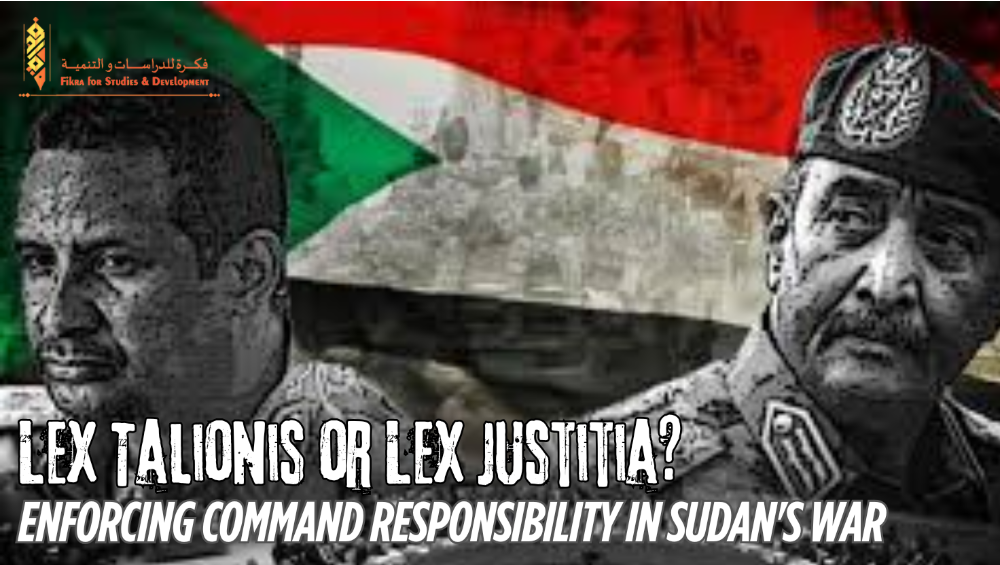Lex Talionis or Lex Justitia? Enforcing Command Responsibility in Sudan’s War
Amgad Fareid Eltayeb
The ongoing war in Sudan has unleashed a torrent of human suffering, marked by atrocities of unprecedented scale and severity. While these egregious violations are often met with rhetorical condemnation, achieving a just and lasting resolution ending them demands a more rigorous response: the enforcement of the principle of command responsibility.
It is essential to transcend the superficiality of prosecuting only foot soldiers and hold accountable those at the apex of military command. For it is their complicity and benefit from such atrocities, along with their failure to prevent or punish them, that fosters an environment conducive to widespread criminality. Accountability must ascend the chain of command, lest we continue to mistake the symptom for the cause.
The Rapid Support Forces (RSF) have, inter alia, engaged in what have been formally recognized by many actors – including the US government– as genocide against Sudanese communities. Systematic rape and sexual violence have been deployed with catastrophic frequency in Khartoum, Al Jazirah, and Darfur, serving as a perverse instrument of subjugation and humiliation. Beyond the horrific physical toll, RSF elements have systematically looted and occupied civilian residences, openly declaring their intent to permanently dispossess their owners. This pattern extends to the brazen militarization of civilian infrastructure, including hospitals, schools, and essential service facilities. Furthermore, the RSF has weaponized starvation, forcibly recruited children and young adults under duress, and deliberately targeted critical infrastructure such as water dams and power stations. The pillaging of humanitarian aid facilities, including those of the World Food Programme and UNICEF, underscores a blatant disregard for international humanitarian law, a practice that continues unabated. The RSF mass detention of civilians for prolonged periods, often exceeding a year, in inhumane conditions has led to a significant loss of life, uncovered only upon the liberation of the whereabouts of these clandestine detention centers by the Sudanese Armed Forces (SAF).
So as not to forget, external actors bear a significant onus of responsibility. The United Arab Emirates, for instance, has sustained an uninterrupted flow of arms and weapons to the RSF, thereby directly enabling the perpetration of these atrocities. Moreover, the UAE has leveraged its global and regional political influence to induce the international community to turn a blind eye to its complicity, presenting itself as a neutral peace partner malgré the incontrovertible evidence of its direct involvement in the Sudanese conflict and its attendant crimes.
The Sudanese Armed Forces’ record is, to be sure, not entirely unsullied since it includes serious allegations amid this war. Accusations of indiscriminate shelling, mistreatment of civilians, and the arbitrary detention of humanitarian volunteers have marred its record. Recent American allegations concerning the SAF’s use of chemical weapons in 2024 further compound these concerns. Nevertheless, the SAF, as a hierarchical institution embedded within the state apparatus, possesses the structural capacity to investigate such allegations, and prosecute offenders to enforce accountability – a critical distinction in the pursuit of justice. But this is not enough and remains hypothetical. While identifying those directly responsible for committing and authorizing crimes becomes easier, political responsibility still requires strict enforcement of the three-pillar principle of command responsibility to ensure justice being served.
The enforcement of command responsibility rests upon a tripartite framework:
- Superior–Subordinate Relationship: A clear hierarchical nexus must exist, demonstrating the accused’s effective control over the perpetrators.
- Knowledge: The superior must possess either actual knowledge of the crime or constructive knowledge, meaning they “had reason to know” based on the prevailing circumstances.
- Failure to Act: The superior must have failed to either prevent the crime ab initio or to punish the perpetrators post-factum.
The Sine Qua Non of Justice for War Crimes: Command Responsibility
The continuation of massacres and atrocities, and the sustained enablement by external actors, stems from a fundamental failure to enforce the principle of command responsibility. This doctrine has remained remarkably estranged from Sudanese political practice although of the prolonged discussions about transitional justice. Indeed, the Framework Agreement and its subsequent documents, which preceded and arguably precipitated the current war, and was a product of negotiations between the Forces for Freedom and Change alliance and military factions with substantial Western and international backing, notably from the United States former Assistant Secretary of State for African Affairs Molly Phee, contained provisions that explicitly exempted military leaders from accountability for crimes they did not directly order. This position stands in stark contravention to the very essence of command responsibility, which stipulates a commander’s culpability for the actions of their subordinates when they knew, or should have known, of the criminal conduct.
The principle of command responsibility is neither novel nor transient. Its foundational tenets are enshrined in the Geneva Conventions (1949) and its Additional Protocol I (1977), which impose clear obligations on commanders to prevent breaches of the law of war. Article 28 of the Rome Statute of the International Criminal Court (1998) further codifies this principle, extending its reach to both civilian and military superiors. Its application is well-established in international legal practice, as seen in the post-World War II International Military Tribunals (Nuremberg and Tokyo) and robustly applied by the International Criminal Tribunal for the former Yugoslavia (ICTY) and the International Criminal Tribunal for Rwanda (ICTR) in prosecuting war crimes, genocide, and crimes against humanity.
The scandalous disregard for this principle within Sudanese political dynamics that are rich in bloody pages, coupled with an overt effort to provide de facto immunity for military leaders, has cultivated an enduring and expanding climate of impunity. This systemic failure has, arguably, emboldened RSF leadership to permit, and even encourage, a spectrum of violations, from ethnic cleansing and rape to the systemic looting of property. These acts serve not only as instruments of terror but also as incentives for RSF combatants and a means of continuous recruitment, all under a veneer of institutional and diplomatic impunity.
The July 1st, announcement of the leadership council of Tāsis alliance—formed by the Rapid Support Forces (RSF) as a political front and chaired by its commander Mohamed Hamdan Dagalo (Hemedti), with Sudan People’s Liberation Movement–North leader Abdelaziz Al-Hilu as deputy—reveals the disturbing trajectory of impunity becoming a pathway to political ascendance. That a figure under whose command forces have committed genocide, systematic rape, forced displacement, and unprecedented looting now seeks to reinvent himself as an ordinary political practitioner is not merely a paradox—it is the direct result of a global failure to enforce command responsibility, both legally, politically and diplomatically. More disquieting still is the participation of other political figures in Tāsis, including the former Sovereign Council member Mohamed Hassan Al-Ta’ayshi, former Minister of Justice Nasredeen Abdulbari, and the chairman of the Umma Party Fadallah Burma Nasir, in addition to figures who were organically affiliated with the ousted Bashir regime up until its fall—such as Ibrahim Al-Mirghani, who held a ministerial position in Bashir’s last government. Their presence in this alliance is not symbolic. It underscores the persistent tendency of these politicians to seek political relevance through alignment with armed force—regardless of the atrocities committed by its weapons. This reflects a willful abandonment of the fundamental notion of politics as a tool for advancing justice and safeguarding the public interest. It also implicates them in the political ownership of the RSF’s ongoing crimes. As such, responsibility for these atrocities no longer rests on Hemedti alone; it is now collectively borne by the leadership of Tāsis as a whole; who had already announced a joint military leadership council.
The doctrine of command responsibility must expand to encompass not only those who issue military orders, but also political actors who legitimize, protect, and benefit from these crimes. As Hemedti uses the blood of victims to purchase political capital, and his allies knowingly stand beside him, the absence of accountability threatens to enshrine violence as a legitimate route to power. The international community’s silence—or worse, its engagement with such political constructs—turns justice into a hollow slogan.
To break Sudan’s cycle of militarized opportunism and transactional violence, command responsibility must be enforced both vertically within armed hierarchies and horizontally across political coalitions that thrive on atrocity.
The international community and mediating bodies cannot be absolved from their flawed approach to addressing the situation. In the current conflict, the United States hosted an RSF delegation in Geneva in 2024 for peace negotiations at the ALPS platform. The US envoy, Tom Perriello, subsequently lauded the RSF’s commitment to a “code of conduct” even as RSF forces were responsible for the deaths of over 650 Sudanese civilians through the shelling of hospitals and residential areas during the same period of talks. Prior to this, in May 2023, following reports of sexual violence by RSF forces, then-US Ambassador John Godfrey issued a tweet condemning the acts but ambiguously attributed them to unspecified “armed actors.” Such euphemistic framing does not merely obfuscate the truth—it functionally shields perpetrators from accountability. This suspiciously generalized statement is what creates institutional impunity.
Without the rigorous enforcement of command responsibility, any prosecutions of individual soldiers will remain pro forma at best, lacking the deterrent effect necessary to halt violations. Worse still, such an approach risks devolving into a form of victim-blaming, as many combatants within the RSF are themselves products of socio-political and economic vulnerabilities that have made carrying arms and serving the political ambitions of their leaders, their sole means of sustenance. While this does not absolve them of their individual culpability, the failure to prosecute commanders perpetuates a vicious cycle where new victims are recruited to commit crimes serving the political ambitions of those very commanders.
While some may emphasize the importance of visible justice—the cathartic effect of seeing direct perpetrators stand trial before their victims—as a necessary step toward reparation, a more holistic conception of justice demands that we look beyond the individuals who physically committed the violations. Many of these perpetrators have themselves been exploited, manipulated into becoming instruments of terror in service of the political and strategic ambitions of those who command them. These senior leaders, often insulated from direct accountability, benefit from the climate of fear, repression, and systematic brutality created by such atrocities—not for tactical gain alone, but as tools of political blackmail and a pathway to greater power.
This is not, in any way, a call for impunity. Rather, it is a call for comprehensive justice—justice that does not stop at the lowest rung of the chain of command, but climbs to hold accountable those who orchestrate violence from a distance and profit from the suffering of others. True justice cannot be selective; it must be both morally complete and structurally intelligent.
Mid-April 2025 saw a positive development in this direction. The Guardian in reported a 142-page file handed to the Scotland Yard’s War Crimes Unit, documenting killings, torture and sexual violence committed by the RSF during Sudan’s ongoing war. The Dossier is filed against RSF leaders and their external sponsors under the ambit of command responsibility with a request to refer it to the International Criminal Court (ICC). This legal action is indeed possible under the British legal system Universal Jurisdiction that allows a state or international organization to prosecute individuals for certain egregious crimes, such as war crimes, crimes against humanity, genocide, and torture, regardless of where the crime was committed, the nationality of the perpetrator, or the nationality of the victim. The Metropolitan Police War Crimes Unit (SO15) is a dedicated unit within the Metropolitan Police’s Counter Terrorism Command for investigating allegations of such violations, e.g. war crimes, crimes against humanity, genocide, and torture. Moreover, while the UK can prosecute under its own universal jurisdiction laws, a referral to the ICC is a separate but often complementary step. This is a commendable stride towards fostering lasting stability and peace in Sudan, for it is through the unflinching application of legal deterrence that the insidious cycle of political impunity can finally be broken.
The International Community: A Mandate for Principled Engagement
The Sudanese crisis presents a stark moral and legal test for the international community. The pervasive atrocities, enabled by a culture of impunity and sustained by external support, demand a fundamental shift in approach. It is no longer sufficient to merely condemn the violence or offer palliative aid; a more robust and principled engagement is required. The international community, in its criminal and political approaches to the Sudanese crisis, must strictly adhere to the implementation of the command responsibility doctrine.
This means a resolute commitment to hold accountable those at the highest echelons of command who have benefited from, failed to prevent or punish the egregious crimes committed by their forces. It necessitates leveraging international legal frameworks to hold accountable not only military leaders within Sudan but also external actors who provide material and political support to factions engaged in systematic violations. There should be no more windows for appeasement. Prioritizing diplomatic expediency or illusive positivity of engagement and stability at the expense of justice for the Sudanese people is not merely a moral failing; it perpetuates the very cycles of violence and impunity that have devastated the country. If Sudan is to break free from cycles of militarized predation and political amnesia, it must inscribe command responsibility into its legal consciousness. Without it, every ceasefire is a pause, not a resolution; every negotiation, a deferral of truth.
For too long, a pragmatic realpolitik has overshadowed the fundamental principles of justice in Sudan. The suffering of the Sudanese people—victims of ethnic cleansing, sexual violence, starvation, and arbitrary detention—cries out for accountability. Only through the unwavering application of command responsibility, both in the courtroom and in diplomatic chambers, can a lasting peace rooted in justice be forged.


